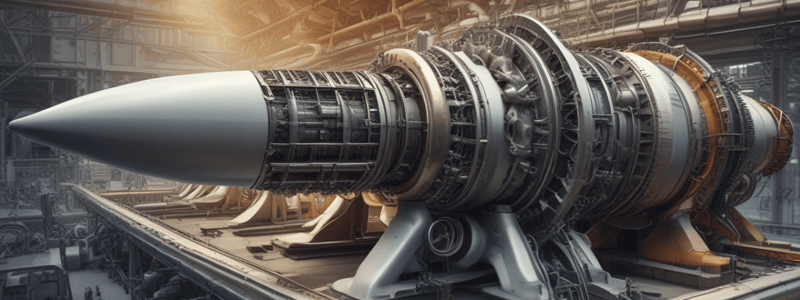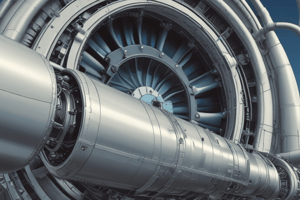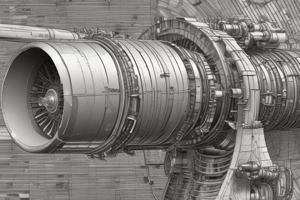Podcast
Questions and Answers
What is the main characteristic of a lubricating oil's viscosity?
What is the main characteristic of a lubricating oil's viscosity?
- Its rate of flow through an orifice at a standard temperature
- Its rate of change in viscosity with temperature change (correct)
- Its resistance to flow at a standard temperature
- Its specific gravity
Compared to reciprocating engine oils, which characteristic is more prominent in turbine engine oils?
Compared to reciprocating engine oils, which characteristic is more prominent in turbine engine oils?
- Higher flash point
- Less tendency to produce lacquer or coke (correct)
- Higher viscosity index
- Greater demulsibility
What is the primary function of engine oil, apart from lubricating?
What is the primary function of engine oil, apart from lubricating?
- Cooling and sealing
- Cooling, sealing, preventing corrosion, and cushioning shock loads (correct)
- Cushioning shock loads and preventing corrosion
- Preventing corrosion only
What determines the proper grade of oil to use in a particular engine?
What determines the proper grade of oil to use in a particular engine?
What is specific gravity a measure of?
What is specific gravity a measure of?
What is an advantage of mineral base lubricants over vegetable oil base lubricants in aircraft engines?
What is an advantage of mineral base lubricants over vegetable oil base lubricants in aircraft engines?
What type of lubricant is required for high tooth pressures and high rubbing velocities, such as occur with spur type gears?
What type of lubricant is required for high tooth pressures and high rubbing velocities, such as occur with spur type gears?
What is a desirable characteristic of turbine engine oil?
What is a desirable characteristic of turbine engine oil?
What is done to protect integral fuel tanks from corrosion due to micro biological contamination?
What is done to protect integral fuel tanks from corrosion due to micro biological contamination?
What is the ideal oil for achieving theoretically perfect engine lubrication?
What is the ideal oil for achieving theoretically perfect engine lubrication?
What parameter needs to be adjusted when switching to an alternate fuel in a turbine engine?
What parameter needs to be adjusted when switching to an alternate fuel in a turbine engine?
Why is kerosene used as a turbine engine fuel?
Why is kerosene used as a turbine engine fuel?
What is calorific value a measure of?
What is calorific value a measure of?
What type of oil is commonly used in gas turbine engines?
What type of oil is commonly used in gas turbine engines?
What does an oil spectroscope measure?
What does an oil spectroscope measure?
What factors affect the ignition of fuel in a turbine engine?
What factors affect the ignition of fuel in a turbine engine?
Why is kerosene preferred over gasoline in turbine engines?
Why is kerosene preferred over gasoline in turbine engines?
What happens to the weight of a tank of fuel when its specific gravity is increased?
What happens to the weight of a tank of fuel when its specific gravity is increased?
What is the temperature at which the Reid vapour pressure of a fuel is measured?
What is the temperature at which the Reid vapour pressure of a fuel is measured?
Which of the following is affected by the specific gravity of fuel?
Which of the following is affected by the specific gravity of fuel?
At what air/fuel ratio will kerosene burn effectively?
At what air/fuel ratio will kerosene burn effectively?
What should be done with Prist or Biopor during use?
What should be done with Prist or Biopor during use?
What does D.E.R.D 2494 refer to?
What does D.E.R.D 2494 refer to?
What does a high viscosity index indicate about oil viscosity?
What does a high viscosity index indicate about oil viscosity?
What is the function of a fuel system icing inhibitor?
What is the function of a fuel system icing inhibitor?
What is the likely outcome of using a lubricant recommended for lower temperatures in extremely high-temperature conditions?
What is the likely outcome of using a lubricant recommended for lower temperatures in extremely high-temperature conditions?
Which measurement indicates the flow characteristics of oil through an orifice?
Which measurement indicates the flow characteristics of oil through an orifice?
What happens to oil pressure when an engine is run in extremely high temperatures with an inappropriate lubricant?
What happens to oil pressure when an engine is run in extremely high temperatures with an inappropriate lubricant?
Flashcards are hidden until you start studying
Study Notes
Lubricants and Fuels
Kerosene and Fuels
- Kerosene burns effectively at an air/fuel ratio of 15:1.
- D.E.R.D 2494 is a type of kerosene.
- Kerosene has more heat energy per gallon and lubricates fuel system components, making it a suitable turbine engine fuel.
Lubricants and Viscosity
- Viscosity is the measure of a liquid's resistance to flow.
- High viscosity index means the oil viscosity will not vary greatly with temperature change.
- The time in seconds required for exactly 60 cubic centimeters of oil to flow through an accurately calibrated orifice at a specific temperature is recorded as a measurement of the oil's viscosity.
- Viscosity index is based on the rate of change in viscosity with temperature change.
- A high viscosity index is desirable in turbine engine oil.
Functions of Engine Oil
- Engine oil performs functions in addition to lubricating, including cooling, sealing, preventing corrosion, and cushioning shock loads.
Oil Types and Characteristics
- Mineral base lubricants have chemical stability, which is an advantage over vegetable oil base lubricants in aircraft engines.
- Synthetic oil is usually used in gas turbine engines.
- An E.P lubricant is required for high tooth pressures and high rubbing velocities in spur type gears.
Fuel System and Corrosion
- A biocidal additive is added to fuel to protect integral fuel tanks from corrosion due to micro-biological contamination.
- Specific gravity of fuel affects aircraft range; a higher specific gravity means a greater weight of fuel for a fixed volume, resulting in a greater range.
Turbine Engine Performance and Fuel
- Calorific value is the amount of heat or energy in one pound of fuel.
- Ignition of fuel depends on both volatility and atomisation.
- Kerosene is used instead of gasoline because it is less volatile and has good lubrication properties.
Oil Analysis and Contaminants
- An oil spectroscope measures contaminants suspended in the oil.
- Oil sampling by spectrometer analysis is used to detect contaminants in the oil.
Studying That Suits You
Use AI to generate personalized quizzes and flashcards to suit your learning preferences.


